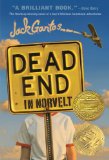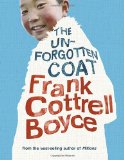Summary | Excerpt | Reviews | Beyond the book | Read-Alikes | Genres & Themes | Author Bio

A friend and I had an interesting conversation this morning about a boy our sons know. The boy's parents are divorced; he lives with his mother and visits his father. The mother just learned of a secret that the boy had been holding for the last year. My friend and I wondered: What was it like for this boy to keep the secret? What rationale did he use for not sharing it? Who was he protecting? What were his fears?
Fascinating, heart-breaking questions, all of them. But my friend and I didn't mull over these questions. Instead, we marveled at this: How this boy's choices came from a thoughtful, valid place. How children are just as whole and just as wise as adults. Of course adults have experiences to lean on (if you put your hand on a hot stove you will get burnt) and well-informed opinions based on them (yes, breaking up with your boyfriend is heart-wrenching, however, over time, you will heal). Yet in many other ways – perhaps the most important ways – children have just as many resources and opinions and perspectives as their adult counterparts. They are well worth paying attention to because children are "present" in a way adults have to re-remember to be. And because children are present, they take in each situation deeply; they are focused on nuance and detail; they make judgments based on a very close read of an experience.
This is the stuff of a whole and wise person. This is the stuff my son's friend is made of. And this is the stuff that Ursula Dubosarky's characters are made of too. In her newest novel, The Golden Day, a group of 11 girls attending an Australian all-girls day school take a trip with their slightly eccentric teacher, Miss Renshaw, to a public memorial garden. The girls meet the garden's groundskeeper, Morgan, also an eccentric fellow, who leads them into a cave by the ocean to see ancient Aboriginal paintings. The girls leave the cave but Miss Renshaw and Morgan are never seen again.
The Golden Day is a mystery and a coming-of-age story. How does a shared tragic experience affect the emotional landscapes of eleven young girls? They feel guilty about the excursion to the garden in the middle of the school day - Miss Renshaw had told them it was "our little secret." So when the headmistress, the priest, the school psychologist and even the police come to question the girls, they silence themselves; eleven petals of a flower close in tight around the bud. They will not rat each other out or their beloved teacher. With haunting, sparse language and a timeless style, Dubosarsky expertly explores this pivotal moment in these girls' lives.
She does this by inhabiting all girls' points of view at once. I can't adequately explain the breathtaking tension, urgency and emotional resonance this technique creates. It is unique, highly inventive and it deeply works. I am not talking about an omniscient perspective, Dubosarsky is not writing simply from up above, in an all-knowing voice, but is, instead, blending that distant voice with an intensely intimate one. To put in another way: she writes about these girls in a way that makes them seem whole and wise – like my son's friend. Perhaps Dubosarsky has arrived at a point of view that is the essence of childhood. All eleven girls become characters that the reader empathizes with and understands, but Dubosarsky is especially skillful at describing two specific girls, Cubby and Icara, the former who has many thoughts to share and the latter who has many secrets to keep.
The Golden Day is deeply magical but also painfully real. It is clear that Dubosarsky is writing from personal experience too. She says:
Perhaps the novel can best be described as a creatively re-imagined version of my own schooldays, a response to the experience of school, like a dream thirty years later. I feel relieved somehow to have written it. It's a kind of a tribute, to the girls, the teachers, the parents, and the school itself and whatever makes up a school - stone, glass, wood, trees, paths, clouds of memories and the sounds of the footsteps of the future.
The novel ends with the first stanza of Robert Louis Stevenson's "Night and Day" from A Child's Garden of Verses:
When the golden day is done,
Through the closing portal
Child and garden, flower and sun,
Vanish all things mortal.
Growing up is not an easy process. The world is mysterious, dark, and maybe what we think is real is not, in fact, so. The event these girls experience on that pivotal day is like a walk through that "portal" – into a place where shadows replace objects and magic and real become intertwined.
But what about the end of the poem?
"Up!" they cry, "the day is come
On the smiling valleys:
We have beat the morning drum;
Playmate, join your allies!"
Day begins again. Forms take shape. Life goes gloriously on. This is equally true for each of the girls in The Golden Day. It is true for my son's wise friend – and for us all.
I recommend The Golden Day to readers ages 12 and up, and urge adults to read it too.
![]() This review was originally published in The BookBrowse Review in August 2013, and has been updated for the
May 2015 edition.
Click here to go to this issue.
This review was originally published in The BookBrowse Review in August 2013, and has been updated for the
May 2015 edition.
Click here to go to this issue.

If you liked The Golden Day, try these:

by Jack Gantos
Published 2013
A sly, sharp-edged narrative about a small western Pennsylvania town and a dead-funny depiction of growing up in a slightly off-kilter place where the past is present, the present is confusing, and the future is completely up in the air.

by Frank Cottrell Boyce
Published 2011
Often laugh-out-loud funny, this moving and simply told novella of two Mongolian brothers learning to fit in to a British school tugs at the heart - a unique story of immigration both fierce in its telling and magical in its characters.
Your guide toexceptional books
BookBrowse seeks out and recommends the best in contemporary fiction and nonfiction—books that not only engage and entertain but also deepen our understanding of ourselves and the world around us.